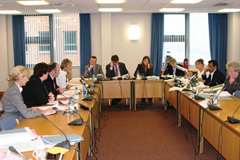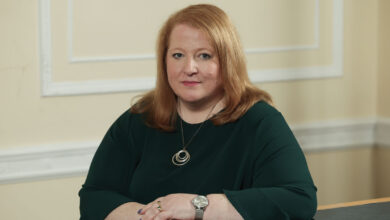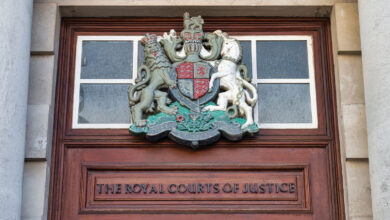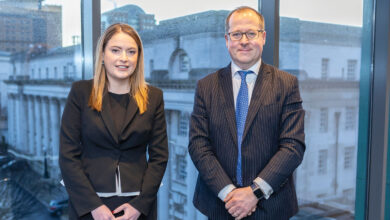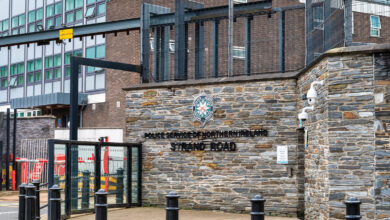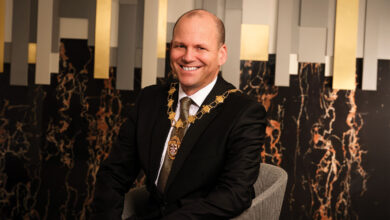Policing and rights
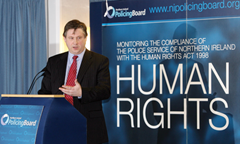 Basil McCrea updates agendaNi on the Policing Board’s work on human rights and professional standards. Far from being an abstract idea, human rights can be practically applied in policing on the ground.
Basil McCrea updates agendaNi on the Policing Board’s work on human rights and professional standards. Far from being an abstract idea, human rights can be practically applied in policing on the ground.
Human rights is not a foreign or ultra- liberal concept, according to Basil McCrea. The UUP MLA, who chairs the Policing Board’s Human Rights and Professional Standards Committee, points out that British parliamentarians helped to draw up the European Convention on Human Rights after World War Two. Winston Churchill was among its early supporters.
McCrea states that human rights is a “basic tenet of democracy and civilisation”. The role of the police is to “uphold everybody’s human rights” but “everybody also has human responsibilities.”
The committee’s formal role is to ensure that the PSNI complies with human rights legislation. “Human rights is at the very core now of professional, modern policing,” he adds, “so our job is not just to ensure the compliance but to ensure that is fully embedded in the very culture of the Police Service.”
There is a view that human rights is a “negative” force that “holds back the police from doing a good job”. In its defence, he explains that the police can only “police by consent” and “have to win the hearts and minds of everyone”. The alternative, without rights, would be a police state.
The police have very powerful rights, including the use of force, and can only be given these if there are “corresponding rights on the other side to say: ‘You can’t use these disproportionately.’”
To give a practical example, he looks back to the Ardoyne riots last July. Many people were unhappy that the police “stood on the line and took it” when under attack. However, dissident republicans wanted officers to break ranks and use their batons, for their own publicity.
Following an assessment from the board’s human rights advisor, it unanimously supported the policing operation put in place by the PSNI to deal with this serious disorder. McCrea sums up the board’s key message as: “No, our Police Service is the finest in the world in public order policing. Officers were disciplined, they do things properly and it’s to their credit that they did it.”
Stop and search
Contentious issues on the committee’s agenda include allegations of state collusion and the use of anti-terrorism powers.
Section 44 of the Terrorism Act 2000 allowed officers to search any person or vehicle in a specified area. It was ruled potentially unlawful by the European Court of Human Rights in July 2010.
“Whilst in any one individual circumstance it may be right to do it, collectively it actually builds up a wave of people saying: ‘Well, the police are victimising me or being unfair here.’” Some communities then claim that the police are not welcome in their area.
“We’ve said to the police: ‘You have used these other stop and search powers [section 21 and 23 under the Justice and Security (Northern Ireland) Act 2007] where you have to have just cause,’” he continues. The PSNI now issues quarterly reports on the number of people who are stopped, the areas in which the searches take place and their frequency.
As a sign of progress, the board’s 2010 Human Rights Report contains five recommendations, compared to 20 in 2009. Its format is now shorter, and the report goes “in tandem” with the thematic inquiries which have been a “really successful innovation”. Each thematic considers a particular subject over four to five months and upcoming inquiries will cover policing with and for the lesbian, gay, bisexual and transgender community, and the use of stop and search powers.
McCrea emphasises that a thematic is “a process rather than an outcome”. Interested stakeholders put forward their views and the committee then gathers responses from the PSNI. The aim is to get a common agreement, even where the recommendations are challenging. Members also check up on progress, six months and 12 months after a report is made; the committee therefore has a “very good relationship” with its stakeholders.
The latest thematic review covers young people and policing, and considers anti- social behaviour, police powers and alternative disposals. However, as it makes clear, young people and anti-social behaviour are sometimes unfairly linked. In Operation Exposure, the police published photographs of suspected rioters after the Ardoyne riot but the board emphasised that pictures of young people should not be used in this way. Publication can stigmatise young people and lead to them being routinely identified.
Groups of young people are sometimes seen as a problem but the committee says that other activities must be provided for them, as an alternative.
“Young people are more likely to be the victims of crime than the perpetrators of crime,” he remarks. “Quite often, the facts fly in the face of public opinion and what we have to do is try and explain: ‘No, this is not correct.’”
The report was launched with a direct internet feed and is linked into new media, so young people can send in their opinions as well.
“It is really important that our society realises that no one is allowed to victimise anybody for whatever reason,” he states, “that you are not allowed to pick on the young or the old or the infirm, or people of a particular religious background, or people of a particular sexuality. And the police are there to go and support everybody.”
On the professional standards side, the Board also plans to look at incivility i.e. where a police officer is rude to a member of the public. It can take up to 13 other contacts with the police to make up for one poor engagement with a police officer.
McCrea admits that some people have a “difficult relationship with the police for historic reasons” but thinks that the complaints process could be improved. The current culture is to send all complaints straight to the Police Ombudsman’s office. Instead, the committee is keen to find ways of resolving problems locally, perhaps through an apology or clearing up a misunderstanding.
Supervisors and commanders need to make sure that officers understand that policing is a “service to the community” and therefore must build relationships.
Overall, McCrea sums up the committee’s relationship with the police as “positively challenging” and says the board is seen as a world leader in how it handles these issues.
There are disagreements but he adds: “I think we have won their respect, that when we make statements they are well- informed and for the better interests of everybody, and that we do take some time to ensure that our points are properly understood.
“We will not, as a committee, shy away from putting out challenging statements but we will always give the police the opportunity to explain the background or to come up with alternatives or to address the various issues.”
The ultimate outcome sought by the committee is “a society where everybody feels that the police are there to protect them, regardless of background, and that if you go to them you get things sorted out. And if you do that, you get a lot more intelligence and information coming forward.”
Committee members
Chair: Basil McCrea MLA Vice-Chair: Mary McKee Martina Anderson MLA Jonathan Bell MLA Rosaleen Moore
Gearóid Ó hEara Alastair Ross MLA Suneil Sharma

